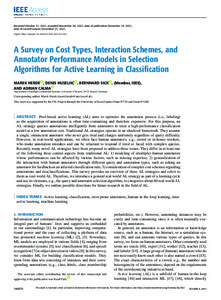Datum
2021-12-14Schlagwort
004 Informatik 300 Sozialwissenschaften, Soziologie 370 Erziehung, Schul- und Bildungswesen Aktives maschinelles LernenHuman-in-the-loopKostenKlassifikationMetadata
Zur Langanzeige
Aufsatz

A Survey on Cost Types, Interaction Schemes, and Annotator Performance Models in Selection Algorithms for Active Learning in Classification
Zusammenfassung
Pool-based active learning (AL) aims to optimize the annotation process (i.e., labeling) as the acquisition of annotations is often time-consuming and therefore expensive. For this purpose, an AL strategy queries annotations intelligently from annotators to train a high-performance classification model at a low annotation cost. Traditional AL strategies operate in an idealized framework. They assume a single, omniscient annotator who never gets tired and charges uniformly regardless of query difficulty. However, in real-world applications, we often face human annotators, e.g., crowd or in-house workers, who make annotation mistakes and can be reluctant to respond if tired or faced with complex queries. Recently, many novel AL strategies have been proposed to address these issues. They differ in at least one of the following three central aspects from traditional AL: 1) modeling of (multiple) human annotators whose performances can be affected by various factors, such as missing expertise; 2) generalization of the interaction with human annotators through different query and annotation types, such as asking an annotator for feedback on an inferred classification rule; 3) consideration of complex cost schemes regarding annotations and misclassifications. This survey provides an overview of these AL strategies and refers to them as real-world AL. Therefore, we introduce a general real-world AL strategy as part of a learning cycle and use its elements, e.g., the query and annotator selection algorithm, to categorize about 60 real-world AL strategies. Finally, we outline possible directions for future research in the field of AL.
Zitierform
In: IEEE Access Volume 9 (2021-12-14) , S. 166970-166989 ; eissn:2169-3536Förderhinweis
Gefördert durch den Publikationsfonds der Universität KasselZitieren
@article{doi:10.17170/kobra-202205036117,
author={Herde, Marek and Huseljic, Denis and Sick, Bernhard and Calma, Adrian},
title={A Survey on Cost Types, Interaction Schemes, and Annotator Performance Models in Selection Algorithms for Active Learning in Classification},
journal={IEEE Access},
year={2021}
}
0500 Oax
0501 Text $btxt$2rdacontent
0502 Computermedien $bc$2rdacarrier
1100 2021$n2021
1500 1/eng
2050 ##0##http://hdl.handle.net/123456789/13801
3000 Herde, Marek
3010 Huseljic, Denis
3010 Sick, Bernhard
3010 Calma, Adrian
4000 A Survey on Cost Types, Interaction Schemes, and Annotator Performance Models in Selection Algorithms for Active Learning in Classification / Herde, Marek
4030
4060 Online-Ressource
4085 ##0##=u http://nbn-resolving.de/http://hdl.handle.net/123456789/13801=x R
4204 \$dAufsatz
4170
5550 {{Aktives maschinelles Lernen}}
5550 {{Human-in-the-loop}}
5550 {{Kosten}}
5550 {{Klassifikation}}
7136 ##0##http://hdl.handle.net/123456789/13801
<resource xsi:schemaLocation="http://datacite.org/schema/kernel-2.2 http://schema.datacite.org/meta/kernel-2.2/metadata.xsd"> 2022-05-03T06:34:49Z 2022-05-03T06:34:49Z 2021-12-14 doi:10.17170/kobra-202205036117 http://hdl.handle.net/123456789/13801 Gefördert durch den Publikationsfonds der Universität Kassel eng Namensnennung 4.0 International http://creativecommons.org/licenses/by/4.0/ Active learning classification error-prone annotators human-in-the-loop learning inter- active learning machine learning 004 300 370 A Survey on Cost Types, Interaction Schemes, and Annotator Performance Models in Selection Algorithms for Active Learning in Classification Aufsatz Pool-based active learning (AL) aims to optimize the annotation process (i.e., labeling) as the acquisition of annotations is often time-consuming and therefore expensive. For this purpose, an AL strategy queries annotations intelligently from annotators to train a high-performance classification model at a low annotation cost. Traditional AL strategies operate in an idealized framework. They assume a single, omniscient annotator who never gets tired and charges uniformly regardless of query difficulty. However, in real-world applications, we often face human annotators, e.g., crowd or in-house workers, who make annotation mistakes and can be reluctant to respond if tired or faced with complex queries. Recently, many novel AL strategies have been proposed to address these issues. They differ in at least one of the following three central aspects from traditional AL: 1) modeling of (multiple) human annotators whose performances can be affected by various factors, such as missing expertise; 2) generalization of the interaction with human annotators through different query and annotation types, such as asking an annotator for feedback on an inferred classification rule; 3) consideration of complex cost schemes regarding annotations and misclassifications. This survey provides an overview of these AL strategies and refers to them as real-world AL. Therefore, we introduce a general real-world AL strategy as part of a learning cycle and use its elements, e.g., the query and annotator selection algorithm, to categorize about 60 real-world AL strategies. Finally, we outline possible directions for future research in the field of AL. open access Herde, Marek Huseljic, Denis Sick, Bernhard Calma, Adrian doi:10.1109/ACCESS.2021.3135514 Aktives maschinelles Lernen Human-in-the-loop Kosten Klassifikation publishedVersion eissn:2169-3536 IEEE Access 166970-166989 Volume 9 false </resource>
Die folgenden Lizenzbestimmungen sind mit dieser Ressource verbunden:
Solange nicht anders angezeigt, wird die Lizenz wie folgt beschrieben: Namensnennung 4.0 International
Verwandte Dokumente
Anzeige der Dokumente mit ähnlichem Titel, Autor, Urheber und Thema.
-
Systematische Entwicklung eines Lerntools zur Erhöhung der Argumentationsfähigkeiten von Studierenden
Konferenzveröffentlichung
Wambsganss, Thiemo; Weber, Florian; Staufenberg, Tobias; Bott, Leopold; Söllner, Matthias (GITO VerlagBerlin, 2020)


